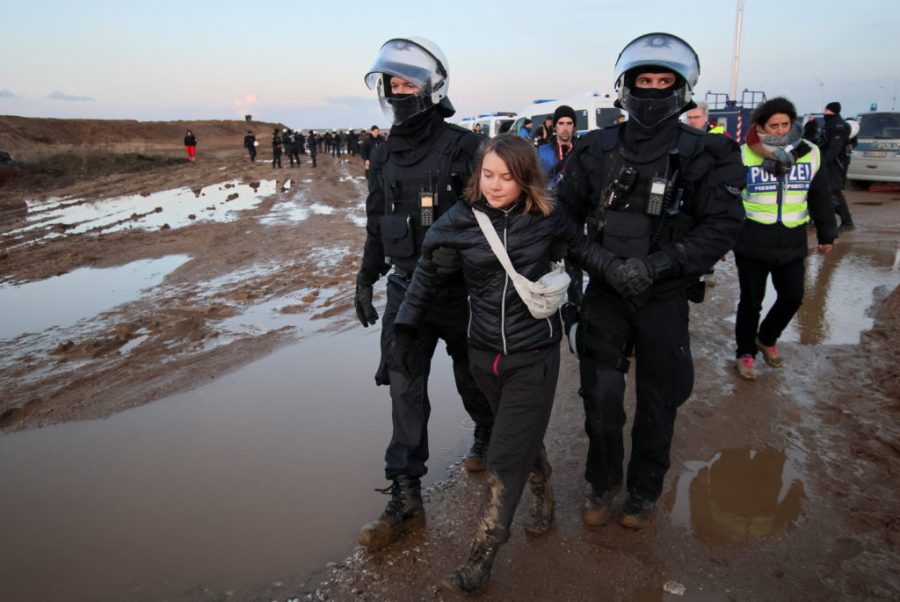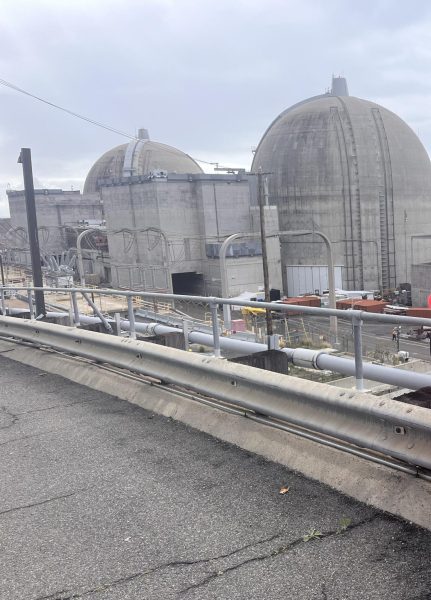Greta Thunberg Arrested at Protest in Germany
Police officers detain climate activist Greta Thunberg on the day of a protest against the expansion of the Garzweiler open-cast lignite mine of Germany’s utility RWE to Luetzerath, in Germany, January 17, 2023 that has highlighted tensions over Germany’s climate policy during an energy crisis. REUTERS/Wolfgang Rattay
Greta Thunberg, a Swedish environmentalist, was detained in Germany following protests over the country’s use of controversial mining techniques. On Jan. 17, the activist was protesting alongside others against a coal mine operation in Lutzerath, Germany.
Thunberg and her fellow protestors stood outside of a coal mine, rallying against the country’s method of extracting coal from its land, which, in this instance, included the process of evicting sections of towns and leveling their buildings to expand the coal mine, “Garzweller II.”
Thunberg was seen being carried out of the protesting site by German police, and sent to be detained. She was among the many other protestors detained by police as a countermeasure to their activism against the coal mine expansion. The German police claimed that the protestors were in a “danger zone” due to the soft, unstable ground around the site, and that the detainment was done to keep them out of harm’s way.
Once released, Thunberg promptly resumed protesting, determined to end the expansion of this coal mine, and eventually stop the country’s process of mining coal completely. The coal in this specific mine is particularly harmful to the environment, releasing more carbon emissions than most other fossil fuels, and climate activists want it banned from use.
Before the expansion in Lutzerath, the German government had already evicted and leveled numerous other villages in the name of this coal mine. The focus on Garzweller II and numerous other mines is the result of Germany’s ongoing energy crisis that started in 2022. Germany obtains most of their natural gas from Russia, but since the Russia-Ukraine invasion, they have cut off most of their business with the country. As a result, Germany could no longer rely on their biggest energy supplier and had to turn to alternate methods. Now, the methods that Germany relies on most heavily are their own coal deposits.
Protestors such as Thunberg condemn the country for using its coal mining machines. Known as the Bagger series, these coal excavators are up to 70 feet wide, with giant saw blade-shaped dozers that cut into the ground nearly 24/7. They are causing irreparable damage to the environment, digging up tons of soil in order to get to the coal hidden underneath.
A significant point of blame for the usage of these heavy machines is Germany’s determination to use natural gasses and fossil fuels over nuclear or renewable forms of energy. Multiple laws went into place that led to the deactivation of nuclear power plants across the country, with a plan to phase the energy out completely by 2022. The energy crisis put a hold on this, and only two power plants are left in the country and are designated as reserve power. Fossil fuels like coal remain the number one method.
The coal burning country is likely going to continue its usage of fossil fuels for the foreseeable future, as it remains its most reliable source of energy. The end of Germany’s energy crisis however, is yet to be predicted, as it relies on the continuation of the Russia-Ukraine conflict. Regardless of the energy crisis, climate activists like Thunberg are prepared to continue protesting against the usage of these harmful fossil fuels until Germany acts accordingly.

Everett is a Senior at Aliso Niguel who is starting his first year at the Growling Wolverine Newspaper. He enjoys writing and taking photos, and is looking...









